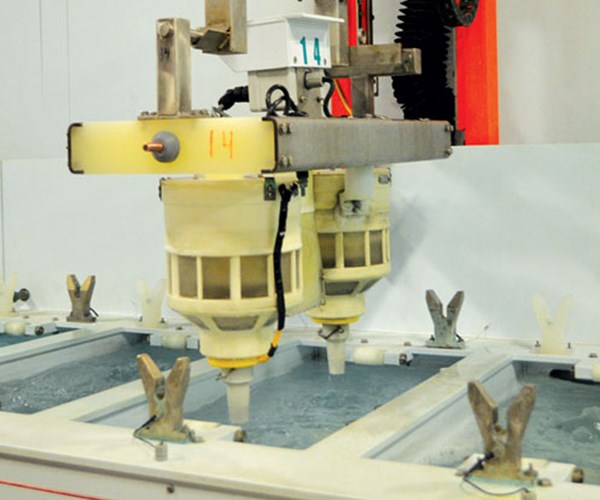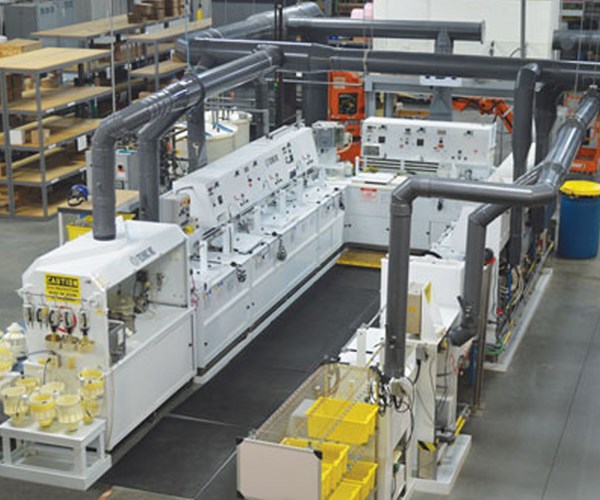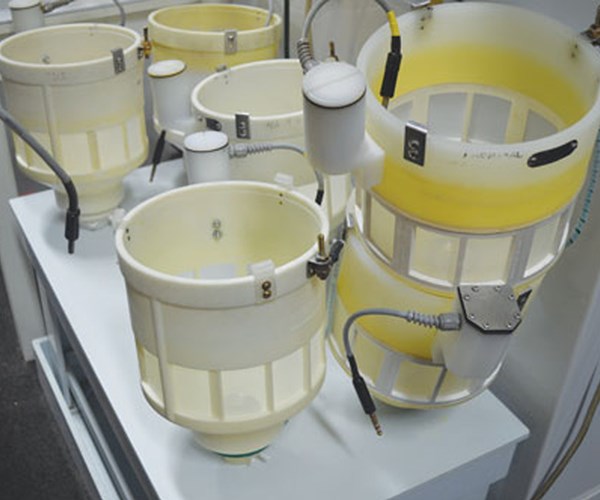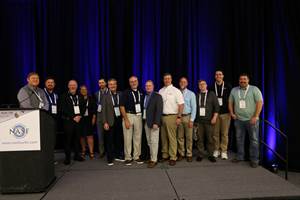Benchmarking a Plating Operation to No. 1
Indiana’s Electro-Spec uses Top Shops data to improve efficiencies.
All that remained of Jeff Smith’s electroplating shop were the charred remnants of a door frame amid the smoldering debris that was once Electro-Spec in Franklin, Indiana.
That chilly March morning in 2003 is forever etched in Smith’s memory, especially since a photo of the fire’s aftermath is framed on the wall in his office.
“It was difficult to see something like that,” says Smith, who eventually rebuilt his shop with hard work and millions of dollars in investments. “It was all gone in just a few hours.”
The remaining door frame served as a metaphor of sorts for Smith; given that when one door closed for him, another opened a few months later when he rebuilt, paving the way for a resurrection likely unseen by many in the finishing industry.
Smith and his management team not only rebuilt the company, but they distinguished themselves amongst the most elite plating shops in the world, earning the distinction of being the Products Finishing Top Shops Benchmarking Survey’s No. 1 shop in 2016.
It was an honor that almost brought Smith to tears, because it validated his struggles over the past decades not only to rebuild and survive in a tough economy, but also to carve out a niche for his employees.
“To be recognized as the best shop in the U.S. is something that is a little hard to comprehend at first,” he says. “But I know how hard my employees and team have worked to get us to where we needed to be. It has been a struggle, but it has also been very rewarding. It was well worth it.”
Precious Metal Plating
Where Electro-Spec is thriving is in the fields of medical, automotive, aerospace, military and RF/microwave industries, often a tough challenge where high quality is demanded on an extremely repeatable basis. The company’s customer base includes the likes of Lockheed Martin, Raytheon, Boeing, Medtronic, Smiths Group, Energizer, Northrop Grumman, Honeywell and TRW.
The shop specializes in precious and semi-precious materials such as gold, silver, nickel, copper, its proprietary Tri-M3 tri-alloy, electroless and electrolytic nickel in thicknesses 5 to 500 microinches. They plate over brass, copper, carbon steel, stainless steel, nickel, phosphorous and Kovar (nickel–cobalt ferrous alloy) among others in processes that include barrel, wire, selective and vibratory.

The SBE process is performed in a chamber with ultrasonic action, with a continuous flow of plating solution being pumped into and out of the chamber.
One of the processes that sets Electro-Spec apart from many shops is its specially designed spouted bed electrode (SBE) process for micro-sized active components that are less than 1 cm in size.
The SBE process is performed in a chamber using ultrasonic action with a continuous flow of plating solution being pumped into and out of the chamber, which facilitates part movement and therefore provides fresh plating electrolyte during the process.
This process is designed for gold, nickel, electroless nickel and copper plating, and is perfect for small parts with features such as flat surfaces, counter bores, tabs, nested parts or complex geometries.
“It ensures that each part receives uniform plating coverage on all surface areas, no matter how complex the geometry,” Smith says. “This makes it the ideal process for parts where vibratory or conventional barrel plating is impossible, or even impractical.”

Technic patented the SBE process for plating small components such as electronic connectors, pins, chip capacitors and resistors.
Rapid Circulation of Parts
Smith learned of the SBE process from Technic, which patented it for plating small components such as electronic connectors, pins, chip capacitors and resistors. The SBE system replaces a 4- by 6-inch barrel using a special chamber with a load size from 50 to 500 milliliters, and it uses significantly less conductive media.
“The SBE plating chamber’s unique design provides for a rapid circulation of the parts over the cathode current feeder without the use of any mechanical movement,” says Dr. George Hradil, Technic’s research director. “Plating solution flow rates carrying the parts through the chamber are exceptionally high, up to 60 liters per minute, which ensures that the parts are always plated in ‘fresh solution,’ irrespective of the configuration and size.”
Both of these attributes result in greatly improved part-to-part thickness distribution and a significant reduction in part-to-part coupling, he says, adding that the SBE’s narrower thickness distribution curve allows the SMT producer to target the average plating thickness of a given load much closer to customer minimum thickness requirements than can be done in standard barrel plating equipment.
“Another advantage of the SBE plating chamber is the elimination of tin or nickel deposits in the screened area of the chamber,” Hradil says. “Unlike a barrel—where plating takes place when the parts are on the barrel screens—the SBE screens are located in a non-plating area. This greatly cuts down on the maintenance of the plating chamber.”

Used in the SBE process, these baskets are designed for small parts with flat surfaces, counter bores, tabs, nested parts or complex geometries.
Small parts are a specialty of Electro-Spec, shown by the 265 million parts it coated in 2015. But the challenge is not just plating the parts—some of which could be implanted into a human body through a heart device—but doing so in a high-quality, zero-reject environment.
That was one of the reasons that Electro-Spec landed atop the Products Finishing Top Shops Benchmarking Survey list. It scored well in each of the four criteria used to determine the benchmarking standards: Current Finishing Technology, Finishing Practices and Performances, Business Strategies and Human Resources/Training.
Benchmarking Standards
“We used the benchmarking numbers from the Top Shops in 2015 to try to improve all of our processes,” Smith says. “It really is a great tool to be able to measure yourself against others in the industry.”
It is also a tribute to the determination of Smith, who holds a bachelor’s degree in government and professional administration from the University of Notre Dame, and who first started working at Electro-Spec in 1994 after he graduated.
In 1997, Smith purchased the company from owner David Yates and took the shop from eight people and $1 million in revenue to more than 40 people with a revenue of approximately $5 million, just five years later.
But all that growth came to a fiery halt in 2003 when just after midnight a piece of faulty equipment sparked a fire that roared so violently that officials on the scene said it caused some tanks to explode and the surrounding neighborhood to be evacuated. All that remained standing was the metal door frame, but the tragedy didn’t deter Smith. While he was forced to lay off half his workers, he immediately began searching for a site to rebuild, and found it several days later just up the road, a 28,000-square-foot facility that was double what he had before.
While the rebuilding took place, the company was essentially out of business for a year. “The big thing was to stay in contact with our customers as much as we could,” says Darren Habig, Electro-Spec’s director of business development. “We drove parts to another plater for our customers, and really anything we could do for them. We all had lists of our customers, and we would talk to them all regularly about our rebuilding efforts.”
Company Reinvention
Smith and his team chose to reinvent Electro-Spec, and borrowed and invested millions of dollars in new equipment and automation to build what they deemed the best state-of-the-art plating facility in the U.S. He and his management team targeted OEMs that demanded repeatable high-quality coatings, and then showed them what the company could do.
“We sought companies that demanded a high level of control and automation to the plating process,” he says. “Our team really pulled together to make this work. It was because of them, not me, that we are here today.”
Electro-Spec was given the Indiana Blue Chip Business Award in 2004 because of its determination to recover from the fire, and Smith was given the Businessman of the Year award by the City of Franklin that same year.
Electro-Spec focuses on teamwork in every phase of the operation, including a commitment toward continual improvement by providing Six Sigma training (green and yellow belt) for all employees.
“Whether they are a new hire or an employee with 25 years of service, every employee plays an integral part in the development and growth of the company,” Smith says. “As a group we inspire each other, and as a team we aspire to succeed.”
The company also grew thanks to its success in four areas:
- Aerospace, where it is a supplier to several of the leading aerospace companies for years, and are involved in several cutting edge technologies
- Medical, specializing in micro-electronic medical components to implantable components and bio-hazard/germicidal components
- Automotive, as leading plating supplier to many Tier One and Two automotive companies, including successful conversions for many different methods and processes that have impacted Ford, GM and Chrysler on safety-critical components
- RF/Microwave, a continuation of over 40 years where it has worked with many of the world’s leading telecommunication companies
“We have done a very good job of not only staying in contact with our customers, but also working very closely with our suppliers to learn about the new chemistries they may have that could help our customers, or even go after new ones,” says Mary Gordon, Electro-Spec’s plant manager and director of operations.
“But we spend a lot of time testing these new chemistries before we take them to our customers, just to make sure they can do what we want it to do.”
Testing Processes
Habig says Electro-Spec has built its entire strategic plan around working closely with customers to test new processes and see where improvements can be made, or where they might not work in full production.
“We ask a lot of questions of our customers about what they are working on, or what they are working with,” Habig says. “It helps us better understand their need today, and in the future.”
Things slowed when the recession of 2008 hit, but Electro-Spec quickly grew almost 70 percent in the ensuing years, going from approximately $6 million in sales to over $10 million.
The growth was fueled in 2012 when Electro-Spec purchased the plating division of a company in Kansas and relocated its operations to a new, larger facility in Franklin, where it has nearly doubled its space to about 60,000 square feet and has 12 acres if it needs to expand again.
Smith says the company is now doing business on an international basis and has 85 employees with sales over $12 million. A lot of that growth comes from several unique patented processes that Electro-Spec’s engineering team has come up with.
When the team identified a need for a plating process that would enhance the performance of RF connectors, it developed Tri-M3 finish, which is 55 percent copper, 30 percent tin, and 15 percent zinc.
“For years, electronic component manufacturers have essentially had two plating choices: nickel or silver,” he says. “Both of these options have their strengths and weaknesses, but government pressure to eliminate nickel plating—coupled with soaring silver costs—has made both of these choices less palatable.”
He says Tri-M3 presents a superior substitute to nickel and silver plating, in nearly all applications, with a shelf life that far exceeds traditional silver plating. Smith says the process has a low surface friction, that is approximately 70 percent that of silver, with high conductivity, superior abrasion resistance, excellent solderability and low internal stress, which allows for forming of plating components.
Antimicrobial Finishes for Medical
Smith is also president and CEO of Steriplate, which he formed in 2013, focusing on the design, development and implementation of antimicrobial finishes for medical and commercial applications. Smith holds a provisional patent application for the Steriplate technology and has filed a utility patent application for the Steriplate technology.
He also recently testified in front of the U.S. House of Representatives’ Subcommittee on Research and Technology about technology for patient safety at Veterans Hospitals, especially that which is designed to stop hospital acquired infections (HAI) among veterans.
“There is the ability of many types of metals to provide a continuous antimicrobial surface to help prevent the spread of HAIs,” Smith says. “There are infinite possibilities of utilizing metal as an antimicrobial finish in a variety of applications inside and outside the human body.”
For information on Electro-Spec, visit electro-spec.com, or call 317-738-9199.
Originally published in the October 2016 issue.
Related Content
Products Finishing Reveals 2023 Qualifying Top Shops
Each year PF conducts its Top Shops Benchmarking Survey, offering shops a tool to better understand their overall performance in the industry. The program also recognizes shops that meet a set of criteria to qualify as Top Shops.
Read MoreTop Shop’s Journey to Building a Unique Brand
Since this new Ohio plater took over the space and assets of a former plating business, it is intentional about setting itself apart from prior ownership.
Read MoreProducts Finishing Reveals 2024 Qualifying Top Shops
PF reveals the qualifying shops in its annual Top Shops Benchmarking Survey — a program designed to offer shops insights into their overall performance in the industry.
Read MoreProduct Finishing’s 2024 Top Shops Benchmarking Survey Deadline Approaches
Taking this year’s Products Finishing’s annual Top Shops Benchmarking Survey? Respondents are urged to complete the survey by April 30, 2024 in order to be considered as a qualifying top shop.
Read MoreRead Next
Education Bringing Cleaning to Machining
Debuting new speakers and cleaning technology content during this half-day workshop co-located with IMTS 2024.
Read MoreEpisode 45: An Interview with Chandler Mancuso, MacDermid Envio Solutions
Chandler Mancuso, technical director with MacDermid Envio discusses updating your wastewater treatment system and implementing materials recycling solutions to increase efficiencies, control costs and reduce environmental impact.
Read MoreDelivering Increased Benefits to Greenhouse Films
Baystar's Borstar technology is helping customers deliver better, more reliable production methods to greenhouse agriculture.
Read More












.jpg;maxWidth=300;quality=90)















